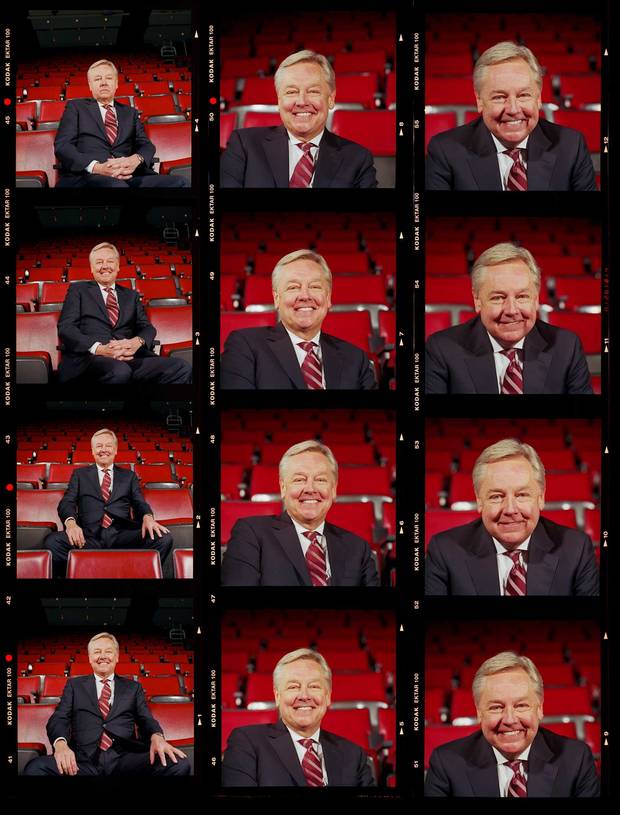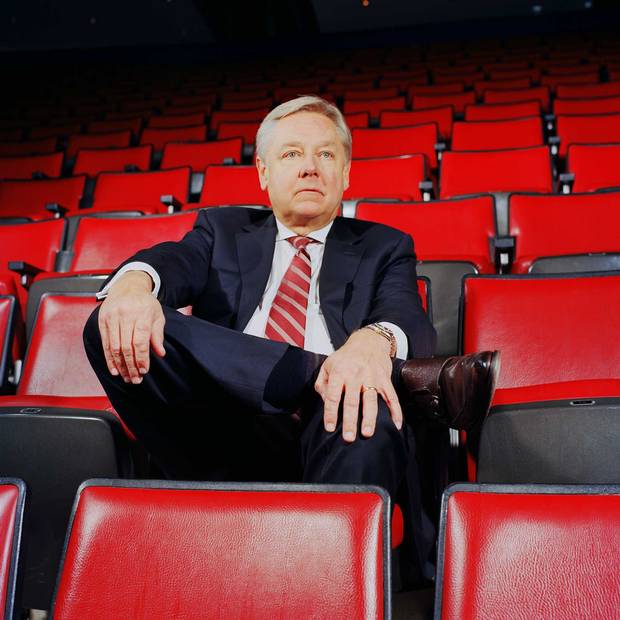Sports franchises are not normal businesses. Braided into the identities of their host cities, crucibles for the passions of their fans, they exist beyond temporal concerns like cash-flow statements and database management. Typically, then, the owners of sports franchises are not normal bosses. They're attention magnets, colourful personalities who embrace being associated with the fortunes of their teams. This isn't inherently a good thing—see Harold Ballard—but it is what we expect. (1) And so, since the days of Conn Smythe, there has been inordinate interest paid to the person at the top of the Toronto Maple Leafs. As recently as 2015, when the CEO of Maple Leaf Sports and Entertainment—owner of the Leafs, along with the Raptors, Toronto FC and more—was the dynamic Tim Leiweke, that person usually fit the mould. But now, that person is 55-year-old Michael Friisdahl. And so the tradition is over.
The only flashy things about Friisdahl are his gold Leafs cufflinks. Formerly CEO of Air Canada's discount carrier, Rouge (and, before that, Thomas Cook North America), he cares very much about cash flow, databases and such. Perhaps that's what's called for now at the top of this complex modern enterprise, but it's a definite change in style. That was evident as a guarded Friisdahl sat for an interview at the Air Canada Centre.
You had no sports experience before MLSE. What made you the right person for the job?
There are a lot of similarities from a business perspective to what I was doing not only in the airline sector, with Rouge and Air Canada Vacations, but hospitality in general. Transportation and sports are both consumer-facing businesses. We fill arenas versus filling airplanes or selling tours. Clearly, we have the team dynamic, which is unique. We have three key verticals that are critical for our organization, being hockey, basketball and soccer. We also have Live, a big entertainment business. I think the board felt the organization was really looking for executive leadership, not necessarily with a focus on a particular sport.
Did you have a mandate from the board when you took the job?
There is no doubt that our No. 1 focus is winning and bringing championship teams to our organization. (2) No. 2, we are going to focus on fan engagement, in and out of the arena.
I saw a phrase used to describe your time here: "cloaked in anonymity." You've certainly managed to avoid being part of the story so far. Is that deliberate, or is it just a reflection of who you are?
It's certainly a reflection of who I am. The teams are really our stars. So if there's any commenting that needs to take place, it should be done by the team leadership. My focus is making sure the teams have what they need to continue to win. I think my style works well with each of our presidents. It allows them to do what they need to do without feeling interfered with in any way, shape or form.
If Leafs president Brendan Shanahan resigned tomorrow, you'd have to hire his replacement. With no background in the industry prior to joining MLSE, how would you go about that?
Well, I'm not going to comment on a hypothetical. What I can tell you is that two years ago, that might have had more credence than it does today. I think now that we're two years in, I would have no issue adapting should the time ever occur.
So you feel fully immersed now in this world.
Oh, absolutely.
Have you had any death threats?
I've had no death threats, no.
Richard Peddie (3) apparently says it comes with the territory.
Well, it hasn't been my experience so far.
You've had time now to put your stamp on things. What's changed here since you arrived?
We don't have a lot of drama around MLSE. I think there is a sense of direction and a sense of purpose and a sense of vision. Most of all, there's a sense that we're all trying to do this together.
You have a challenging board structure to work with, because you have three owners, and two of them are direct competitors. (4) How have you found working with them?
It has been a very positive experience. We've got professional leaders on the board who run major organizations very successfully. Their primary objective is to ensure MLSE focuses on producing winning championship contenders. There has never been an issue of alignment.
When the Leafs were owned by the Ontario Teachers' Pension Plan, there was a sense among fans that the owners treated the team as a cash register—that they weren't putting money in, they were just taking it out. Has that changed?
It's certainly not the case today. I can't comment on what it was like before I got here. If you look at the Raptors, we've just built a $50-million-plus training facility at Exhibition Place, which is arguably the best in the NBA. When you look at our BMO Field, we've just put between $130 million and $140 million into some significant enhancements.
Were those your initiatives?
BMO Field and the practice facilities were initiated before I got here. Some of the investments we are making today include upgrades to our current facilities here, and some of the fan-engagement technology investments that we probably wouldn't have been focused on before.
Let's talk about the Toronto Argonauts purchase. (5) Was that your initiative?
We've had a partnership with the Argos at BMO Field for the past two years. And so we have obviously had a great opportunity to spend more time understanding the Argos and the organization. And so us acquiring the Argos became a natural extension of the partnership we already had.
But it was somebody's decision to do that.
Well, clearly it's an ownership decision, ultimately.
I'm asking whether you brought this to the ownership, or whether somebody on the owners' side said you should buy them, or…
I'm not going to go into the actual process of the transaction, because I don't think that's appropriate. As you can see, the transaction occurred.
Let's get into the recent Air Canada Centre naming rights deal. (6) Whose initiative was that?
Well, it's part of a process that comes up. Air Canada was nearing the end of their contract period, so in the normal course of that process, renewal negotiations were ongoing. That ultimately led to completing a deal with Scotiabank.
Can you give me more insight into how that evolved?
As an organization, we wanted to make sure we got what we felt was the right valuation for the naming rights, but it was also a lot more than just a naming-rights transaction. We look at Scotia as a partner that will be able to bring their Digital Factory—a big driver of their digital initiatives within the bank. You look at their partnership with Cineplex, with the Scene Card—we see great opportunities we want to explore.
Did Air Canada want to continue as the name of the facility?
Absolutely. Air Canada was very engaged in this process. They made the decision at a certain point to say, "Well, we are going to continue with MLSE in a very strong partnership, but it's not going to include naming rights."
Were you negotiating directly with Air Canada CEO Calin Rovinescu?
I'm not going to go into who I was negotiating with.
How did you arrive at $800 million over 20 years?
The process got us there. For Scotia, this is a lot more than just a naming-rights deal. This is really about their strategy, if you look at the commitment Scotiabank has to hockey right across Canada.
Did you work with consultants to help set the valuation?
As I said, my preference is not to go into the actual process because I think it's inappropriate. Scotia certainly had consultants working with them.
But you set the price, not them, presumably.
Well, it was a negotiated process, as you well know.
But you're negotiating against something, right? If, at a certain point, Air Canada dropped out and there was no other bidder besides Scotiabank, how did you get more out of them?
We got to where we got to in the process. And as I said, it was more than just naming rights in the true sense. Between our organizations, we felt the price tag we ultimately negotiated was the right number.
How many sports events have you attended in the past two years?
Oh! I'm almost going to say countless, because I've been to most events held at the Air Canada Centre or any one of our venues. If I'm in town, not travelling, I would be here.
Is that a big change for you?
Absolutely. The one thing you don't recognize when you take on a role such as this is that you obviously have your day job, but then you also have an evening job, which includes an awful lot of events. I'm not complaining, but it's a big time commitment.
You mentioned your "style" earlier. How would you describe it?
My focus is to put the right team around me—the right group of people to take the priorities we've established for the organization and carry them forward. We need strong leadership in each one of our verticals. I think having a focused management team, and a focused employee group, is critical. It's provided, I believe, a culture of winning that we probably haven't had in a long time.
You're saying the culture you created is contributing to the winning?
It's not a function of anyone taking credit. We have always had a strong culture at MLSE. But as an organization, we have to make sure everybody understands, right from ownership to senior leadership to the staff on the front line, exactly what is the priority of the organization and what an important role we all play. And so our internal employee communication is significant.
How many sports executives—people at your level—have you met so far?
I've met many.
Do you feel comfortable in that group? Do you stand out in any way in your mind?
I feel very comfortable. The thing I have found very interesting is how MLSE is perceived in the sports and entertainment world. It's a very well-respected organization. You can be proud to go anywhere and represent MLSE.
When can we expect the announcement that MLSE has bought the Blue Jays? It's the one pro team in Toronto you don't already own.
I've had absolutely no discussions in that regard. And I think the ownership of the Blue Jays have made it quite clear that they are not forecasting any change to ownership any time soon. (7) That's really all I can say on that point.
[1] Ballard was majority owner of the Leafs from 1972 to his death in 1990 and was a notorious jerk.
[2] Toronto FC won the MLS Cup in December, its first since the team's debut in 2007. The Leafs last won the Stanley Cup in 1967.
[3] Richard Peddie was the first CEO of MLSE, from 1998 to 2011.
[4] Rogers Communications and Bell Canada jointly own 75%, while Larry Tanenbaum's Kilmer Sports company holds the remaining 25%.
[5] For the past three years, the Argos have been held by a consortium controlled by two of MLSE's three owners, Larry Tanenbaum and Bell Canada. In December, two weeks after the Argos won the 2017 Grey Cup, MLSE announced it was buying the team.
[6] In August, Scotiabank purchased the 20-year naming rights to the Air Canada Centre, which, as of July 1, 2018, will be called Scotiabank Arena. Forbes has called the $800-million deal the largest ever in North America.
[7] Rogers CFO Tony Staffieri told a conference in December that the company, now led by CEO Joe Natale, was considering selling off non-core assets, including the Blue Jays.

Andrew McGill
